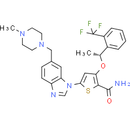Description
GSK-461364 is a Polo-like kinase 1 inhibitor, is also a small molecule Polo-like kinase 1 (PLK1) inhibitor with potential antineoplastic activity. Polo-like kinase 1 inhibitor GSK461364 selectively inhibits Plk1, inducing selective G2/M arrest followed by apoptosis in a variety of tumor cells while causing reversible cell arrest at the G1 and G2 stage without apoptosis in normal cells. Plk1, named after the polo gene of Drosophila melanogaster, is a serine/threonine protein kinase involved in regulating mitotic spindle function in a non-ATP competitive manner.
Product information
CAS Number: 929095-18-1
Molecular Weight: 543.60
Formula: C27H28F3N5O2S
Synonym:
GSK461364A
GSK 461364A
GSK-461364A
Chemical Name: (R)-5-(6-((4-methylpiperazin-1-yl)methyl)-1H-benzo[d]imidazol-1-yl)-3-(1-(2-(trifluoromethyl)phenyl)ethoxy)thiophene-2-carboxamide
Smiles: CN1CCN(CC2=CC3=C(C=C2)N=CN3C2=CC(O[C@H](C)C3=CC=CC=C3C(F)(F)F)=C(S2)C(N)=O)CC1
InChiKey: ZHJGWYRLJUCMRT-QGZVFWFLSA-N
InChi: InChI=1S/C27H28F3N5O2S/c1-17(19-5-3-4-6-20(19)27(28,29)30)37-23-14-24(38-25(23)26(31)36)35-16-32-21-8-7-18(13-22(21)35)15-34-11-9-33(2)10-12-34/h3-8,13-14,16-17H,9-12,15H2,1-2H3,(H2,31,36)/t17-/m1/s1
Technical Data
Appearance: Solid Power
Purity: ≥98% (or refer to the Certificate of Analysis)
Solubility: Soluble in DMSO, not in water
Shipping Condition: Shipped under ambient temperature as non-hazardous chemical or refer to Certificate of Analysis
Storage Condition: Dry, dark and -20 oC for 1 year or refer to the Certificate of Analysis.
Shelf Life: ≥12 months if stored properly.
Stock Solution Storage: 0 - 4 oC for 1 month or refer to the Certificate of Analysis.
Drug Formulation: To be determined
HS Tariff Code: 382200
How to use
In Vitro:
GSK461364 inhibits cancer cell line proliferation from multiple origins with minimal toxicity in nondividing human cells. [1] RNA silencing of WT p53 increases the antiproliferative activity of GSK461364. As many cancer therapies tend to be more effective in p53 WT patients, the higher sensitivity of p53-deficient tumors toward GSK461364 could potentially offer an opportunity to treat tumors that are refractory to other chemotherapies as well as early line therapy for these genotypes. GSK461364 is a thiophene amide that inhibits purified Plk1 enzyme in vitro with a Ki of 2 nM and has >100-fold selectivity for Plk1 compared with Plk2 and Plk3. GSK461364 is a potent inhibitor of cell proliferation causing 50% growth inhibition (GI50) below 100 nM in most of the cell lines tested with limited toxicity against human nonproliferating cells. Inhibition of cell cycle progression is concentration dependent with initial delay at G2 phase at high GSK461364 concentrations and arrest at M phase at lower concentrations. Currently, GSK461364 is in a dose-escalation first-time-in-human trial. Cell lines with mutations in the TP53 gene tended to be more sensitive to GSK461364, and that inhibiting the p53 response by RNA silencing confers increased sensitivity in some p53 wild-type (WT) cells. Furthermore, these more sensitive cell lines also have increased levels of chromosome instability, a characteristic associated with TP53 mutations. [2] In preclinical testing, GSK461364 shows antiproliferative activity against multiple (>120) tumor cell lines and potently inhibits the proliferation of greater than 83% and 91% of these cell lines, with IC50 values lower than 50 and 100 nM, respectively. [3]
In Vivo:
Cell culture growth inhibition by GSK461364 can be cytostatic or cytotoxic but leads to tumor regression in xenograft tumor models under proper dose scheduling. GSK461364 shows clear antitumor activity in human tumor xenograft models. [1] GSK461364 shows a dose-dependent mitotic arrest in mouse xenografts, which correlates with effects on tumor growth. [2] Intraperitoneal administration of GSK461364 causes regression or tumor growth delay in different xenograft models, including Colo205 xenografts. Suppression of Plk1 in vivo by using GSK461364 results in mitotic arrest with aberrant mitotic figures consisting of monopolar or collapsed mitotic spindles. [3]
References:
- Gilmartin AG, et al. Cancer Res, 2009, 69(17), 6969-6977.
- Degenhardt Y, et al. Mol Cancer Ther, 2010, 9(7), 2079-2089.
- Olmos D, et al. Clin Cancer Res, 2011, 17(10), 3420-3430.
Products are for research use only. Not for human use.
Payment & Security
Your payment information is processed securely. We do not store credit card details nor have access to your credit card information.


